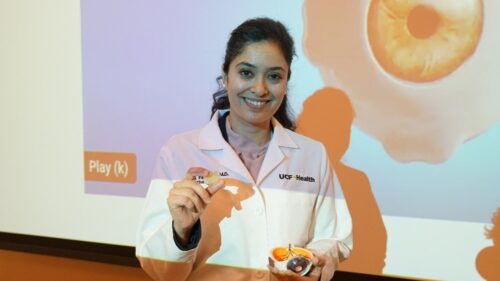
Cataracts unfortunately come with age, and recently UCF Heath Ophthalmologist Dr. Monika Farhangi visited the university’s Legacy Pointe retirement community to tell residents about cataracts and how they can be treated.
Cataracts occur when the eye’s lenses become cloudy over time, causing blurry vision, colors appearing faded and difficulty seeing at night. The condition is very common – affecting more than 65 million people worldwide. In addition to their impact on eyesight, cataracts can pose other health issues for seniors, Dr. Farhangi explained. For example, seniors with difficulty seeing face an increased risk of falling. They may reduce their social engagements, which is a risk factor for dementia. And reduced vision means less sensory information going to the brain.
Fortunately, she said, cataract surgery offers a permanent solution with a high success rate, few complications and a speedy recovery.
“Cataract surgery doesn’t just improve your vision, “she told more than 50 Legacy Point residents who attended the event. “it’s life changing.”
The procedure involves making a small incision on the eye while the patient is under a local anesthetic, then using a small probe to break up the cataract and removing it with suction. Then, a new, clear artificial lens is put in place of the old, cloudy one, restoring the patient’s vision.
“The first day, patients can see the difference,” Dr. Farhangi said. “They say ’The colors are so vibrant, I can read the sign, I don’t see halos and glares anymore,’ and it will continue to get clearer over time.”
Patients’ vision generally continues to improve over the following weeks and months as they adjust to the new lenses.
While no surgery is without risk, Dr. Farhangi said the benefits of cataract surgery far outweigh the risks. And she follows up with patients a day, week and month after surgery to monitor for infection, inflammation or other side effects.
“We always follow up so that if side effects do happen, you aren’t alone,” she said.
Attendees asked questions about different options for cataract surgery, how certain medications they are taking could affect the procedure and shared their own experiences with cataract removal.
“I got the procedure done 26 years ago and I wish I would have got it done 10 years earlier,” one said.
Legacy Point at UCF offers seniors the opportunity to be part of the university community with a variety of programs and activities, including guest lectures by UCF faculty. In addition to caring for patients at UCF Health, Dr. Farhangi graduated from the UCF College of Medicine and has returned to Orlando to care for the community she loves. UCF Health’s other ophthalmologist is Dr. Mehul Patel.
Resident Sandy North had cataract surgery decades ago but said she attended Dr. Farhangi’s presentation because she wants to concentrate all her healthcare within the UCF Health team.
“My experience with UCF Health has been very good,” she said.
UCF Health is the clinical practice of the UCF College of Medicine. It provides primary and specialty care at two locations – in East Orlando just blocks from the main UCF campus and in Lake Nona. For more information, please visit https://ucfhealth.com/
Dr. Farhangi is currently accepting new patients for refractive cataract surgery and general ophthalmology conditions. Please visit https://ucfhealth.com/doctor/monika-farhangi-m-d/ to schedule an appointment.
Post Tags
- health healthy living
